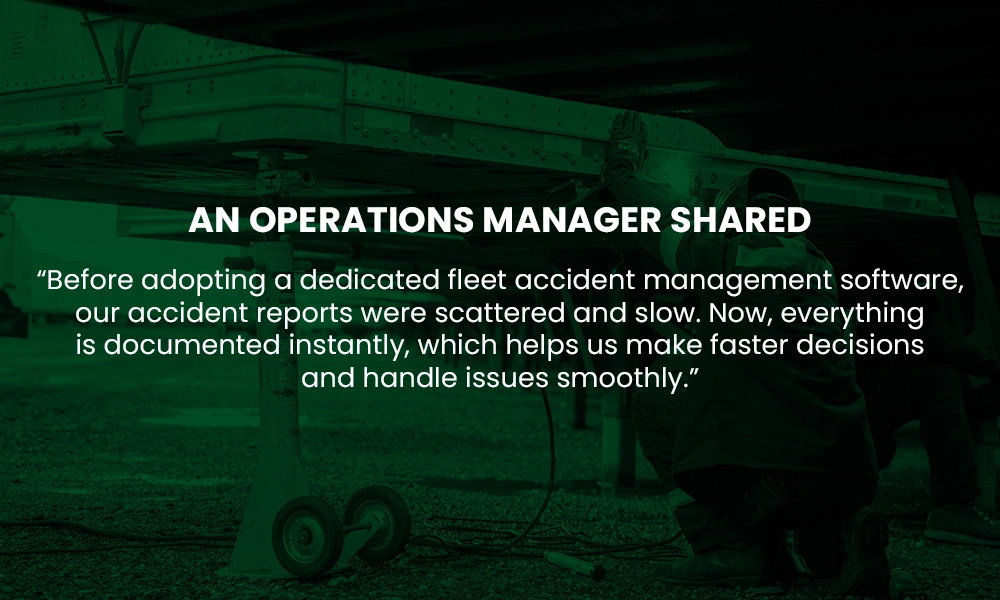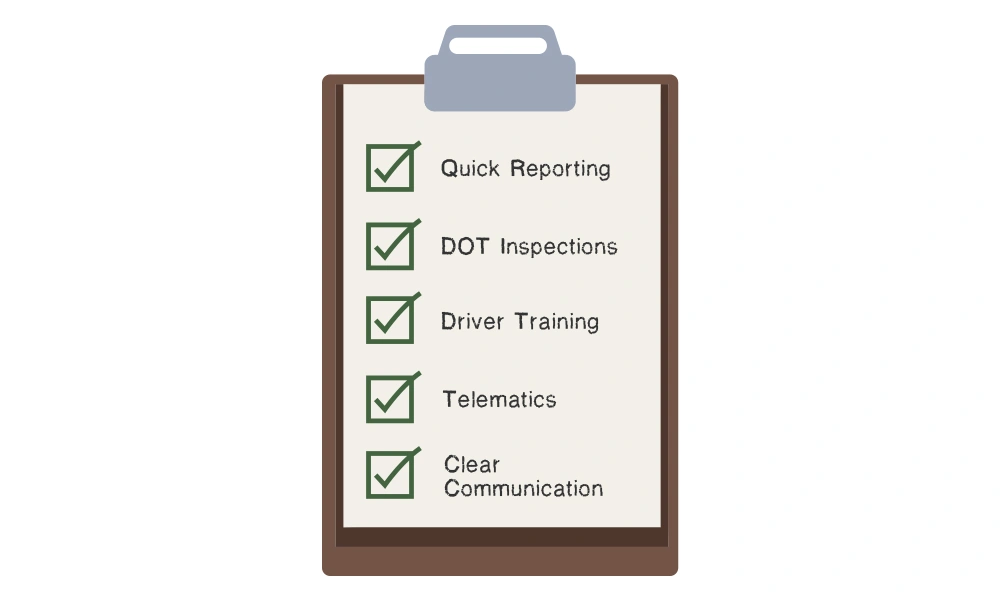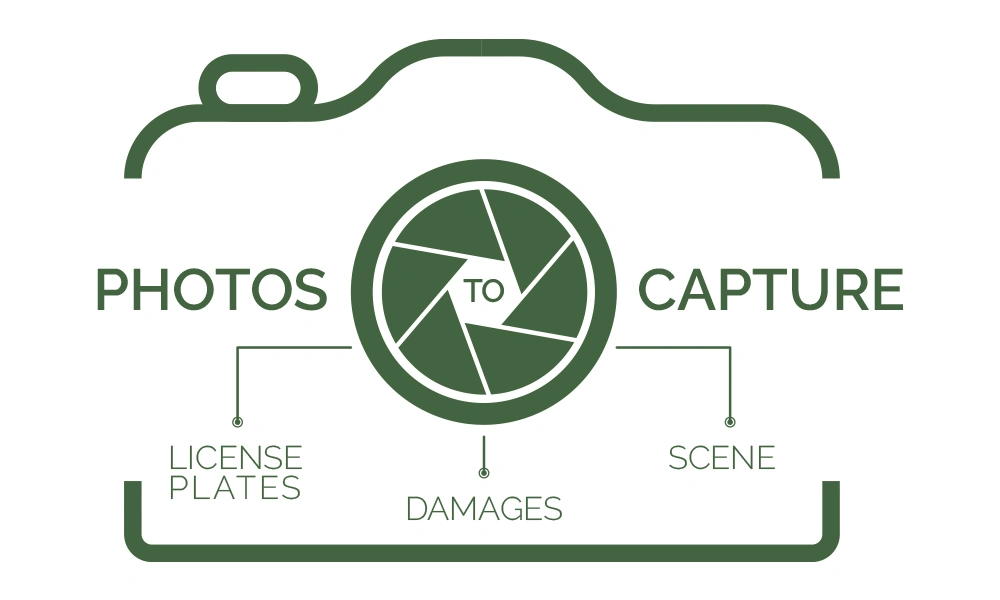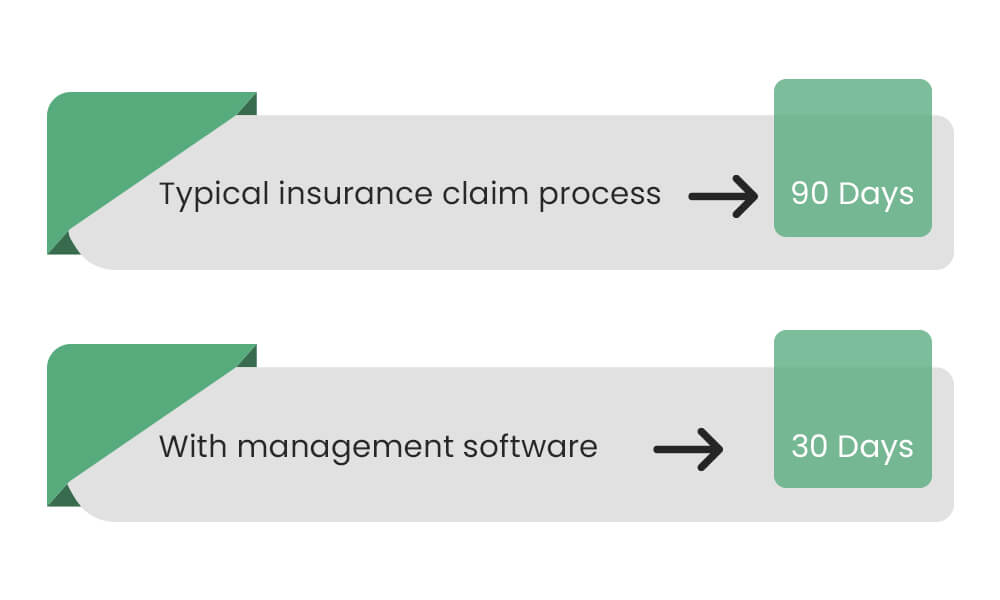5 Effective Strategies for Fleet Accident Management

The efficient running of a fleet does not only reside in keeping trucks moving; it is about keeping them safe. Fleet accident management is also an essential component in the smooth and cost-efficient running of an operation. Effective accident management can spare thousands of dollars and the headaches that come with wasted work hours waiting for insurance claims to come through, and limited time off from work due to downtime after a particular accident. However, good accident management does not just happen miraculously. It involves an evident plan and the proper equipment.
For owners and managers deep in the logistics hustle, efficient management of accidents will allow getting your trucks back on the road, keeping drivers safe, and, at the same time, you can also control the cost of repairs. As an operations manager with a tight delivery schedule or a fleet owner wading through tons of paperwork, an efficient accident management strategy will make all the difference to your bottom line.
What is fleet Accident Management?
Fleet accident management is the process of handling vehicle accidents involving commercial fleets from the moment a crash occurs to the final insurance claim and repair. The target is to reduce downtimes, manage costs, and enhance overall fleet management safety. This involves accident reporting in time, assistance to drivers, liaising with insurance companies, and proper repair. Productive accident management will not only safeguard your assets and drivers but also ensure that you are in line with the industry requirements.
Quality accident management services are more than a reaction to accidents, especially to those involved in the fleet industry. Preventative measures include the conduct of DOT inspections regularly and the conduct of regular truck preventive maintenance, and the incorporation of telematics technology that tracks driver behavior and truck fitness. Such an active approach mitigates risks and helps in vehicle accident management in a more comfortable way. The complete lifecycle of handling a fleet accident, including highway accident management, is ultimately safer and more efficient for the fleets on the road.

Why effective fleet accident reporting matters?
Getting a quick and accurate report on the accident is the heart of logistically effective fleet accident management. Effective reporting can help ensure that the right information can reach the right people quickly, avoiding confusion and thus helping to eradicate delays related to repair and fleet insurance claims. Having reliable accident management services prevents accidents from becoming drawn-out nightmares that bring your operation to a stop.
– An operations manager shared,
“Before adopting a dedicated fleet accident management software, our accident reports were scattered and slow. Now, everything is documented instantly, which helps us make faster decisions and handle issues smoothly.”
This immediate communication also helps to improve the ongoing fleet driver safety efforts and overall fleet management safety, making sure lessons are learned and risks are lowered after every incident.
High Cost of Fleet Accidents
When it comes to operating a fleet, accidents not only threaten safety concerns but also financial setbacks that you can not afford. Fleet accident management is vital due to the fact that the crash costs of a particular fleet go far beyond the repair bills. It consists of lost time, higher insurance rates and premiums, medical expenses, and possible legal expenses.
– A fleet manager said
“After a serious accident, downtime and paperwork killed our schedule and cash flow. Investing in reliable fleet accident management software wasn’t cheap, but it saved us tens of thousands of dollars in avoided delays and faster claim processing.”
This shows how smart accident management reduces financial risks while supporting fleet driver safety.

Key Strategies for Effective Fleet Accident Management
Running a successful fleet means being ready for the unexpected, and accidents happen. The key to minimizing their impact is having a strong fleet accident management strategy in place. This includes everything from quick accident reporting and driver support to smooth fleet insurance claims and repair coordination. Among the best strategies for effective fleet accident management are maintaining regular DOT inspections and thorough truck preventive maintenance.
Strong fleet incident management protocols ensure clear communication, quick decision-making, and accurate documentation, all of which are required for faster fleet claim management. Business owners, like a Midwest fleet operator, found that focusing on these processes helped reduce fleet violation management problems and sped up repairs, which ultimately saved them big on overall fleet management costs.
Implementing Proactive Maintenance and Inspections
Among the most brilliant things in the field of fleet accident management is scheduling preventative fleet repair and consistent checks. Through scheduled DOT inspections and a structured truck preventive maintenance schedule, fleet managers can now have the opportunity to troubleshoot any issues arising with their fleets before they lead to fatal crashes. This strategy not only reduces working stoppages and costly repairs but also adds safety to the roads for drivers and other people.
– A fleet owner shared,
“Our proactive maintenance program has cut down on unexpected issues, making our vehicle accident management smoother and less costly.”
Driver Training and Safety Programs
Investing in thorough driver training is another pillar of effective fleet accident management. Strong fleet driver safety programs train drivers on defensive driving, compliance, and handling emergency situations. These programs reduce the number of accidents and also help with fleet violation management by keeping drivers sharp on the rules of the road.
– An operations manager noted,
“After launching a monthly safety refresher course, our accident rates and insurance claims noticeably dropped. Drivers feel safer and more confident behind the wheel, which benefits the entire fleet.”
Real-Time Monitoring and Telematics
Using telematics technology is a game-changer in today’s fleet accident management. It assists in real-time tracking of driver behavior, vehicle health, and even in detecting reckless driving, like Hard Braking, etc. This data fuels immediate feedback and improves ongoing fleet accident and driver safety management.
– A Midwest fleet manager reported,
“Since installing telematics, we’ve prevented several potential accidents by coaching drivers based on live data, improving safety, and cutting down on insurance claims.”
Integrating telematics with smart fleet accident management software helps make your overall accident management process faster and more efficient.
Solutions for Managing Fleet Accidents After They Occur
Accidents are a bitter truth in the trucking industry, but the way you react after it may create a world of difference. Smart fleet accident management is characterized by having a clean and structured process to handle the aftermath quickly and efficiently. That saves you costly downtime and helps take care of your drivers, and safeguards your fleet’s reputation. Powerful accident management services cover intelligent conveniences, simplistic communication, and professional assistance to harmonize everything, ranging from reporting to repairs and insurance submissions as well.
– One fleet manager shared,
“After an accident, coordinating repairs and insurance was overwhelming until we started using a dedicated fleet accident management software. Now, everything flows smoothly, and our trucks get back on the road faster.”
This shows how technology, paired with solid processes, plays a vital role in modern fleet incident management.
Establishing a Clear Accident Response Plan (Immediate action), tweak the heading.
The next key step in effective fleet accident management is a well-articulated, emergency accident response strategy. When an accident occurs, drivers and managers are to be aware of precisely what is to be done: the priority should be given to safety, the accident scene should be secured, the emergency services are to be called, and a notification made to dispatch. This kind of clear protocol reduces confusion and helps control damage quickly.
– An owner-operator explained,
“We created easy-to-follow accident steps for drivers, which helped reduce panic and sped up our overall response.”
When combined with modern tech tools, your team can handle crashes with confidence and much faster.

Accident Documentation and Reporting
An efficient and effective record keeping is the prime aspect of winning the claims game. Shorter and fairer settlements of insurance claims are supported by capturing all the necessary photos of the scene, vehicle damage, witness, and driver statements, all in a shorter amount of time. Digital tools such as fleet accident management software result in a faster process with less time wasted.
– An operations manager noted,
“Switching to digital accident reporting cut our downtime and helped with quicker claims approvals.”
Proper documentation also helps people in the logistics business, in their ongoing fleet violation management and safety improvements.
Post-Accident Investigation and Analysis
Getting to the root of the cause of every crash results in better long-term fleet management safety. Examining the root causes will reveal ‘why’ the accident happened. Such as driver misjudgement, vehicle malfunctions, or other external conditions can be brought to attention, providing the opportunity to alter training or maintenance.
– One fleet manager shared,
“Analyzing accidents helped us identify unsafe routes and update driver safety training, reducing repeat crashes.”
Combined with real-time insights from telematics technology, this analysis strengthens your overall fleet accident and driver safety management strategy.

Legal and Claims Management
Legal aspects of a crash may be overwhelming. Effective fleet claim management would require experience and accuracy on the part of the insurance company. Outsourcing to informed accident management services or the use of specialized software also assists in ensuring that the paperwork is kept cogent and claims are resolved as quickly as possible.
– A claims specialist said,
“Working with a dedicated team improved our claim turnaround and cut legal risks. Having proper fleet management insurance in place made a huge difference in payouts and process speed.”
Accident Management Services
Professional accident management services take the weight off your shoulders by handling the complex parts of post-accident work, arranging repairs, managing claims, and guiding drivers through recovery.
– A fleet owner shared,
“Using expert accident management services let me focus on running my business while they handled the accident hassle.”
Services from providers like Epika Fleet combine technology and expertise to deliver end-to-end solutions tailored for busy fleets wanting to minimize downtime and reduce risk.
Manage and Prevent Fleet Accidents with Epika Fleet
Managing and preventing fleet accidents requires a clear, reliable partner who understands the daily challenges of the logistics hustler. Epika Fleet offers comprehensive fleet accident management solutions that cover everything from accident prevention to quick response and efficient claims handling. With tools designed to improve fleet driver safety, streamline fleet incident management, and reduce fleet management cost, Epika Fleet helps keep your trucks on the road and your business running smoothly.
– One fleet president shared,
“Since switching to Epika Fleet’s platform, our accident reporting and claim process have become faster and more accurate. The integrated approach combining DOT inspections and telematics technology gave us better control over safety and helped cut accident rates.”
This collaboration between technology and expert support makes Epika Fleet a trusted choice for fleets ready to take accident management seriously.
Conclusion
The modern world has forced fleet accident management to the center of the stage, as it is the only way to stay safe, reliable, and profitable. A smart investment in accident management services and technology not only safeguards your employees and trucks but also reduces downtime, decreases insurance expenses, and streamlines the overall efficiency of your fleet. By investing in prevention, effective responses to accidents, and well-organized claims, you eliminate the unpredictability of setbacks.
– A seasoned fleet manager summed it up well
“Fleet accident management changed how we run our business. With better reporting, driver safety programs, and quick claim processing, we reduced accidents and saved money.”
The effectiveness of a well-planned pragmatic approach has indeed been shown successfully in real-world operations. To flawlessly control and avoid common fleet accidents in your fleet, read how Epika Fleet can simplify the integration of the latest technologies and professionals into your workflow. When your fleet is operating safer and more efficiently, it gives you peace of mind, and each mile on the road is worth its weight in gold.
FAQ’s
 What is fleet incident management?
What is fleet incident management?
Fleet incident management is the process of handling vehicle accidents and incidents promptly, including reporting, driver support, repairs, and insurance coordination.
 What are fleet management solutions?
What are fleet management solutions?
The term fleet management solutions refers to the tools and services that help manage vehicle tracking, maintenance, driver safety, and accident handling to improve fleet efficiency and reduce costs.
 What is the biggest importance of fleet management?
What is the biggest importance of fleet management?
The biggest importance of fleet management is ensuring safety, reducing costs, maintaining compliance, and keeping trucks on the road to meet delivery schedules efficiently.
